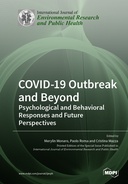Explore

COVID-19 Outbreak and Beyond
0 Ungluers have
Faved this Work
Login to Fave
The COVID-19 pandemic drastically changed our lifestyle when, on 30 January 2020, the World Health Organization declared the coronavirus disease outbreak a public health emergency of international concern. Since then, many governments have introduced unprecedented containment measures, hoping to slow the spread of the virus. International research suggests that both the pandemic and the related protective measures, such as lockdown, curfews, and social distancing, are having a profound impact on the mental health of the population. Among the most commonly observed psychological effects, there are high levels of stress, anxiety, depression, and post-traumatic symptoms, along with boredom and frustration. At the same time, the behavioral response of the population is of paramount importance to successfully contain the outbreak, creating a vicious circle in which the psychological distress impacts the willingness to comply with the protective measures, which, in turn, if prolonged, could exacerbate the population’s distress. This book includes: i) original studies on the worldwide psychological and behavioral impact of COVID-19 on targeted individuals (e.g., parents, social workers, patients affected by physical and mental disorders); ii) studies exploring the effect of COVID-19 using advanced statistical and methodological techniques (e.g., machine learning technologies); iii) research on practical applications that could help identify persons at risk, mitigate the negative effects of this situation, and offer insights to policymakers to manage the pandemic are also highly welcomed.
This book is included in DOAB.
Why read this book? Have your say.
You must be logged in to comment.
Rights Information
Are you the author or publisher of this work? If so, you can claim it as yours by registering as an Unglue.it rights holder.Downloads
This work has been downloaded 130 times via unglue.it ebook links.
- 130 - pdf (CC BY) at Unglue.it.
Keywords
- acute myocardial infarction
- adoption of PARs
- anti-vax
- Anxiety
- behavioral change
- behavioral determinants
- China
- Cognitive function
- Collective behavior
- compensatory control
- Confidence
- Contamination
- coping strategy
- coping with stress
- Coronavirus
- coronavirus pandemic
- COVID-19
- COVID-19 epidemic
- COVID-19 lockdown
- COVID-19 Pandemic
- COVID-19 preventative behaviors
- COVID-19 preventive behaviors
- cues to action
- customer engagement
- Dentistry
- Depression
- distance learning
- distress
- distress questionnaires
- eating disorder
- Emotion Regulation
- emotional distress
- Emotional intelligence
- Emotions
- Exercise
- extended theory of planned behavior
- Fear
- fear of infection
- future anxiety
- gender differences
- government response
- health anxiety
- health belief model
- Health education
- health information
- healthcare avoidance
- healthcare utilization
- help-seeking behavior
- hospital workers
- hybrid theoretical framework
- infection rate
- information and communications technology (ICT)
- information seeking
- information-seeking behavior
- insomnia
- institutional climate
- intention-based critical factors
- intrusive thoughts
- Isolation
- killing time
- lifestyle
- Lockdown
- Longitudinal studies
- longitudinal study
- media consumption
- mental and physical health
- Mental health
- Mental illness
- mindfulness
- music listening
- need for structure
- negative affect
- NLTK
- novel coronavirus
- Obesity
- obesity surgery
- Occupational stress
- Okara, Pakistan
- older adults
- online health information
- online survey
- online survey of patients and contacts
- Optimism
- Pakistan
- Pandemic
- pandemic prevention
- pandemics
- path analysis
- path modeling
- pathogens
- perceived susceptibility
- Personality
- precaution measures
- precautionary behavior
- primary emotional systems
- protection motivation theory
- psychiatric patients
- psychiatric symptoms
- psycho-emotional impact
- Psychological distress
- Psychology
- Psychopathology
- Public Health
- public health emergency preparedness
- Python
- Quality of life
- Quarantine
- remote work
- risk perception
- risk-taking
- Safety measures
- safety-seeking behaviors
- SARS-CoV-2
- satisfaction with life
- Saudi Arabia
- Self-control
- Self-efficacy
- sentiment analysis
- Service Robot
- sleep quality
- Social Class
- social connectedness
- social dilemma
- Social distance
- Social Distancing
- Social media
- social media news use
- Social Support
- Society & Social Sciences
- Socioeconomic status
- Stress
- Students
- subjective well-being
- sustained effects
- technology and society
- television news use
- undergraduate students
- university students
- vaccinations
- vaccine hesitancy
- VADER
- worries
- Young Adult
Links
DOI: 10.3390/books978-3-0365-3014-7Editions

